Reserve Bank of Australia Annual Report – 2020 International Financial Cooperation
The COVID-19 pandemic has highlighted the need for international cooperation across a range of areas. International forums have stepped up their engagement and revised their priorities to focus on COVID-19-related issues, consistent with their objectives to facilitate cooperation on pressing global and regional issues. Groups in which the Reserve Bank participates have taken steps to mitigate the economic impact of the crisis, address stress in financial markets and foster a sustainable global recovery. Some of these forums have also considered how the regulation, oversight and structure of the global financial system have needed to adapt to facilitate the policy response to the pandemic. While face-to-face international meetings ceased in March 2020, central banks have continued to meet via video- or teleconferences and have increased the frequency of meetings owing to the rapid pace of developments. The timely sharing of information between members has been an important and valuable aspect of the Bank's participation in these international groups.
Group of Twenty (G20)
Purpose
The G20 facilitates international cooperation on economic, financial and other policy issues among 19 country members – including Australia – from all regions of the world, as well as with the European Union, International Monetary Fund (IMF) and other international organisations.
Reserve Bank Involvement
The Reserve Bank is represented at high-level meetings of the G20 by the Governor and Assistant Governor (Economic), while other senior staff participate in select G20 working groups and contribute to the G20's financial regulation reform agenda.
The G20 – chaired by Japan from January to November 2019 and by Saudi Arabia since December 2019 – has served as a key forum for members to cooperate in their responses to the COVID-19 pandemic and to share experiences on policy measures. In April, G20 members committed to use all available policy tools to support the global economy, boost confidence, maintain financial stability and prevent deep and prolonged economic effects from the pandemic. Key G20 policy measures and commitments have been combined into the ‘G20 Action Plan – Supporting the Global Economy through the COVID-19 Pandemic’. These include measures to manage the health crisis created by the pandemic and support the economic recovery. While face-to-face meetings ceased in March, the G20 has held a number of regular and extraordinary meetings via video conference facilities.
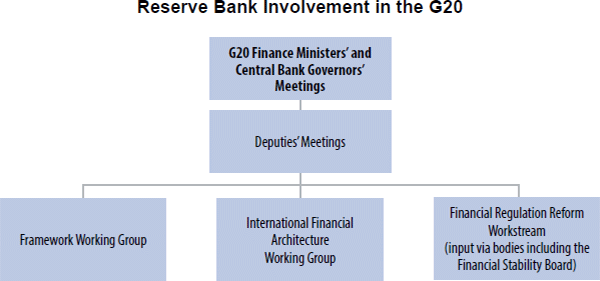
Apart from the meetings of the finance ministers and central bank governors and their deputies, Reserve Bank staff participated in two G20 working groups – the Framework Working Group and the Working Group on International Financial Architecture.[1] In recent months, the focus of the first working group was to create and update the G20's Action Plan. This group also progressed Saudi Arabia's key priority of exploring policies that improve access to opportunities for all people. In the wake of the pandemic, the key focus of the Working Group on International Financial Architecture was to facilitate the temporary suspension of official sector bilateral debt repayments by low-income countries. The group also monitored volatility in capital flows in emerging market economies and how these countries have responded to this volatility.
Reserve Bank staff also contributed to the G20's financial regulation reform agenda. This has quickly been re-prioritised to focus on pandemic-related risks for the global financial system, and on the appropriate supervisory and regulatory responses to the crisis. As discussed below, the Financial Stability Board (FSB) took a key role in the G20's response in this area. The G20 and standard-setting bodies encouraged members to use the flexibility within international regulatory standards, as well as regulatory waivers or deferrals, when responding to the financial effects of the pandemic, to ensure that the financial system continued to support the economy. The importance of these activities was emphasised in the April 2020 G20 Action Plan noted earlier. The Reserve Bank, along with other Council of Financial Regulators (CFR) agencies, will continue to work with their overseas counterparts on addressing issues posed by the pandemic for the financial system and also on the broader global financial regulatory reform agenda.
Financial Stability Board (FSB)
Purpose
The FSB promotes international financial stability by coordinating national financial sector authorities and international standard-setting bodies as they work towards developing strong regulatory, supervisory and other financial sector policies. It also plays a central role in assessing new and evolving global trends and risks.
FSB members include representatives from 24 economies as well as the main international financial institutions – including the Bank for International Settlements (BIS) and the IMF – and standard-setting bodies such as the Basel Committee on Banking Supervision (BCBS).
Reserve Bank Involvement
The decision-making body of the FSB is the Plenary. The Governor is a member of the Plenary, as well as the Steering Committee and the Standing Committee on Assessment of Vulnerabilities. The Governor is also a member of the Regional Consultative Group for Asia.
Senior staff from Financial Stability Department and Payments Policy Department participate in meetings of various FSB groups, including the:
- Analytical Group on Vulnerabilities, which supports the work of the Standing Committee on Assessment of Vulnerabilities
- Financial Innovation Network
- Working Group on Regulatory Issues in Stablecoins.
The FSB was established by the G20 to help coordinate the international financial regulatory response to the global financial crisis. This role was again at the forefront in 2020 as part of the FSB's response to the pandemic. As the effects of the pandemic took hold, the FSB promoted the coordination of financial policy responses in order to maintain global financial stability, keep markets open and functioning, and preserve the financial system's capacity to finance growth. A key element of the FSB's response was to assess the global financial stability risks and vulnerabilities related to the COVID-19 pandemic and related containment policies. This focused initially on the marked stress in financial markets, followed by the ongoing severe impact on the global economy and its cumulative effects on banks, other market participants and the wider financial system. Much of this work was undertaken by the FSB's Standing Committee on Assessment of Vulnerabilities. This committee quickly initiated work on the effects of the pandemic on key aspects of the financial system that are critical for global financial stability. These include the ability of:
- financial institutions and markets to channel funds to households, businesses and governments
- market participants to obtain US dollar funding, including in emerging markets
- financial intermediaries, such as investment funds, to meet liquidity demands (such as redemptions) without forced asset sales
- market participants (including central counterparties (CCPs)) to manage counterparty risks.
The FSB will closely monitor developments to identify any emerging issues in a timely manner, especially as public support measures begin to be unwound.
While the FSB re-prioritised much of its work to focus on the response to the pandemic, other work progressed during the year, including through a number of groups and committees in which the Bank participates.[2] These included the:
- Non-bank Monitoring Experts Group, which conducts an annual global monitoring exercise to assess trends in non-bank financial intermediation, as well as analysing its potential risks
- Financial Innovation Network, which undertakes analysis of the financial stability implications of financial innovation. Recent topics discussed include: global stablecoin arrangements and crypto-assets; the growth of ‘BigTech’ in finance; and the use of technology for regulatory and supervisory purposes
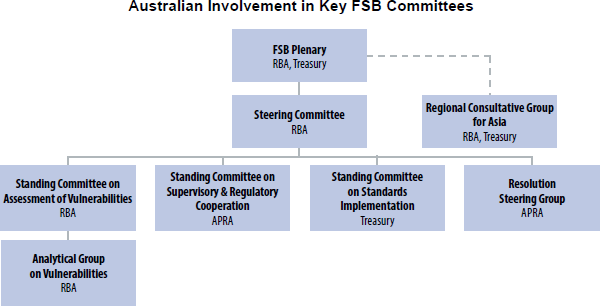
- Working Group on Regulatory Issues in Stablecoins, which published a consultative report in April on the regulatory, supervisory and oversight challenges raised by global stablecoin arrangements with associated recommendations. After incorporating feedback from the consultation, the final report will be issued in October 2020
- Cross-border Payments Coordination Group, which has been coordinating among the relevant international organisations and standard-setting bodies the development of a roadmap to enhance cross-border payments. The roadmap is to be submitted to the G20 in October 2020
- Cross-border Crisis Management Group for Financial Market Infrastructures (a subgroup of the Resolution Steering Group) which has been working on resolution arrangements for CCPs, including recently issued draft guidance on financial resources to support CCP resolution and the treatment of equity in resolution
- Official Sector Steering Group, which is progressing reforms of interest rate benchmarks, including coordinating the transition away from the use of London Inter-Bank Offered Rates (LIBOR) by the end of 2021, when official sector support for the benchmark will end. A key focus of this group is to ensure financial markets and institutions are continuing to make preparations for the end of LIBOR after the end of 2021.
Assessing and continuing to respond to the effects of the pandemic will be priorities for the FSB for the immediate period ahead. However, when the health crisis and associated financial stability risks begin to abate and financial markets increasingly normalise, the previously agreed priorities on the G20 financial regulatory agenda will again be likely to be a focus for the FSB. Areas of such work include the full, timely and consistent implementation of the financial sector reforms developed after the global financial crisis (taking into account recent implementation deferrals announced by the standard-setting bodies in response to the pandemic) and further assessments of the effectiveness of the G20's financial sector reforms following the global financial crisis.
Bank for International Settlements (BIS)
Purpose
The BIS and its associated committees play an important role in supporting collaboration among central banks and other financial regulatory bodies. They do so by bringing together officials to exchange information and views about the global economy, vulnerabilities in the global financial system and other issues affecting the operations of central banks.
Reserve Bank Involvement
The Reserve Bank is one of 62 central banks and monetary authorities holding shares in the BIS. The Governor or Deputy Governor participate in the bimonthly meetings of governors and in meetings of the Asian Consultative Council. The Governor chairs the Committee on the Global Financial System, and the Assistant Governor (Financial Markets) is a member of the Markets Committee and the Committee on the Global Financial System.
The Committee on the Global Financial System seeks to identify potential sources of stress in the global financial system and promotes the development of well-functioning and stable financial markets. The Markets Committee considers how economic and other developments, including regulatory reform and technological change, may affect financial markets, particularly central bank operations.
These committees have been monitoring the challenges for financial systems and markets from the pandemic, providing an important means for central banks to share perspectives on the evolving crisis. Areas of focus included the significant stresses in domestic and international funding markets, the capacity of financial intermediaries to meet increased demand for funding and risks posed by high levels of indebtedness. Members also shared their experiences with the policies being undertaken by central banks. From March 2020, these committees met frequently by teleconference.
These committees also carried out work on a number of longer-term topics through the year, many of which took on additional relevance in light of the pandemic. During 2019/20, Reserve Bank staff participated in a number of working groups of the Markets Committee and Committee on the Global Financial System, including:
- a Committee on the Global Financial System working group on the efficacy of unconventional monetary policy tools across countries, including how policies can be sequenced and coordinated and their potential side effects, with the final report published in October 2019
- a Markets Committee working group looking at how large central bank balance sheets affect the functioning of money and bond markets, with the final report published in October 2019
- a Committee on the Global Financial System study group on the domestic and international drivers of property prices across economies, with the final report published in February 2020
- a Committee on the Global Financial System working group on US dollar funding in the international financial system, including the structure of these activities and the vulnerabilities they pose, co-chaired by the Assistant Governor (Financial Markets), with the final report published in June 2020.
Basel Committee on Banking Supervision (BCBS)
Purpose
The BCBS is hosted by the BIS and is the international standard-setting body for the banking sector. It provides a forum for regular cooperation on banking supervisory matters among its 28 member jurisdictions. It seeks to enhance understanding of key supervisory issues and improve the quality of banking supervision worldwide.
Reserve Bank Involvement
The Governor is a member of the Group of Governors and Heads of Supervision, which is the oversight body for the BCBS. The Assistant Governor (Financial System) is a member of the BCBS. A Deputy Head of Financial Stability Department is a member of the Macroprudential Supervision Group.
As the global standard-setter for the banking sector, the BCBS was a key part of the international regulatory response to the pandemic. Under the oversight of the Group of Governors and Heads of Supervision, the BCBS's response entailed several elements. It announced measures to support the financial and operational resilience of banks. These included deferrals in the implementation schedule for key BCBS reforms to allow banks to commit their full resources to respond to the pandemic. Another element was to re-prioritise its own work to focus on the risks (such as increased insolvencies) presented by the crisis for the banking system. With the pandemic preventing physical meetings, the Bank, along with the Australian Prudential Regulation Authority (APRA), took part in several teleconferences to develop and agree on the responses to the crisis.
In addition to focusing on the pandemic, other work undertaken by the BCBS over the year included: an ongoing program of monitoring the implementation of its standards, in particular the Basel III capital and liquidity reforms; progress on a strategic review of its future priorities, structure and processes (the BCBS aims to finalise this review later in 2020); assessing the progress made by banks in preparing for the transition from LIBOR to alternative reference rates; publishing a discussion paper on the design of a prudential treatment for crypto-assets; and work on strengthening the operational resilience of banks. During the year, the BCBS also established a high-level Task Force on Climate-related Financial Risks which published a stocktake report in April on members' regulatory and supervisory initiatives on climate-related financial risks.
The Macroprudential Supervision Group monitors systemic risks arising from the banking sector, especially those posed by global systemically important banks (G-SIBs), and develops policies to address these risks. The group discussed several issues during 2019/20, including the annual G-SIB assessment exercise (which underpins the list of G-SIBs identified by the FSB) and the experience with the Basel III counter-cyclical capital buffer.
Committee on Payments and Market Infrastructures (CPMI)
Purpose
The CPMI is hosted by the BIS, and serves as a forum for central banks to monitor and analyse developments in payment, clearing and settlement infrastructures and sets standards for them. It has 28 member institutions.
Joint working groups of the CPMI and the International Organization of Securities Commissions (IOSCO) bring together members of these two bodies to coordinate policy work on the regulation and oversight of financial market infrastructures.
Reserve Bank Involvement
Staff members from Payments Policy Department are members of the CPMI, CPMI-IOSCO Steering Group, CPMI-IOSCO Implementation Monitoring Standing Group and CPMI-IOSCO Policy Standing Group. The Head of Payments Policy Department is chair of the CPMI's RTGS (Real-time Gross Settlement) Working Group, which includes a staff member from Payments Settlements Department as a participant. Staff members in Payments Policy Department participate in the CPMI's Working Group on Digital Innovations and a Payments Settlements Department staff member participates in a task force on wholesale payments security. The Assistant Governor (Business Services) participates in the CPMI Cross-Border Payments Taskforce (which is assisting the FSB to deliver a roadmap to enhance cross-border payments).
CPMI (and IOSCO) joined other financial policymakers and international standard setters in engaging industry in discussing international policy responses to the COVID-19 pandemic. The CPMI monitored the effects on financial market infrastructures (FMIs) of the pandemic and the market volatility over the first quarter of 2020. The CPMI and the CPMI-IOSCO Steering Group met regularly to discuss these matters and consider the forward-looking work plan to focus on some of the short-term risks and policy implications and reduce lower-priority demands on industry stakeholders.
The CPMI published a number of reports during the year to which Payments Policy Department staff contributed, including:
- a report in December 2019 (together with IOSCO) that outlined ways in which financial authorities cooperate to promote the safety and efficiency of FMIs
- a report in December 2019 that sets out the various criteria for developers and market participants to consider in designing digital tokens for wholesale transactions
- a report in June 2020 (together with IOSCO) on default management auctions processes at CCPs, which identified practices that CCPs could consider in the development and improvement of these auctions.
Staff members also contributed to a number of CPMI-IOSCO implementation monitoring reports that are yet to be published.
Cooperative Oversight Arrangements
Purpose
The Reserve Bank participates in several multilateral and bilateral arrangements to support its oversight of foreign-headquartered FMIs that play an important role in the Australian financial system. These include overseas-based FMIs that hold Australian clearing and settlement facility licences, for which the Reserve Bank has certain regulatory responsibilities under the Corporations Act 2001, and an overseas-based payments system that plays an important role in Australia's financial system.
Reserve Bank Involvement
Staff from Payments Policy Department participated in:
- an arrangement led by the Federal Reserve Bank of New York to oversee CLS Bank International, which provides a settlement service for foreign exchange transactions
- a global oversight college and a crisis management group for LCH Limited, both chaired by the Bank of England
- an information-sharing arrangement with the US Commodity Futures Trading Commission, in relation to CME Inc.
- the Society for Worldwide Interbank Financial Telecommunication (SWIFT) Oversight Forum, chaired by the National Bank of Belgium
- discussions hosted by the Swiss Financial Market Supervisory Authority (FINMA) on a payment system licence application made by the Swiss-based Libra Association in respect of the proposed global Libra stablecoin payment system.
International Monetary Fund (IMF)
Purpose
The IMF oversees the stability of the international monetary system via:
- bilateral and multilateral surveillance, which involves monitoring, analysing and providing advice on the economic and financial policies of its 189 members and the linkages between them – Article IV consultations, which are a key means to do this, are conducted for Australia every year
- the provision of financial assistance to member countries experiencing actual or potential balance of payments problems.
Reserve Bank Involvement
Australia holds a 1.38 per cent quota share in the IMF and is part of the Asia and the Pacific Constituency, which is represented by one of the IMF's 24 Executive Directors. Australia also contributes to the IMF's supplementary borrowed resources. The Reserve Bank supports the Constituency Office at the IMF by seconding an advisor with expertise in economic and financial sector matters. The Bank also works with the Australian Treasury to provide support to the Constituency Office on matters discussed by the IMF's Executive Board.
A key part of the IMF's response to the COVID-19 pandemic has been the provision of financial assistance to member countries. The IMF has received an unprecedented number of requests for assistance via its emergency financing facilities – the Rapid Financing Instrument and Rapid Credit Facility. These emergency arrangements can be quickly disbursed, and do not have conditionality attached once the funds have been lent. From March to June 2020, new emergency financing agreements covering 66 countries were announced, amounting to SDR18 billion; all of these requests were from emerging or developing economies. In the wake of the crisis, the IMF also committed financing through its non-emergency facilities; this included standby or extended financing arrangements for five countries, as well as three precautionary facilities (the latter being lines of credit that can be called on when needed). These new non-emergency lending arrangements had a value of SDR42 billion. Consistent with the increased demand for financial assistance, IMF total credit outstanding increased by around 35 per cent in the 12 months to June 2020; payments to Argentina and Egypt made the largest contribution to the increase in credit outstanding.
The IMF has also expanded its toolkit in response to the COVID-19 pandemic. For example, the Fund has introduced the Short-term Liquidity Line, a facility designed to provide liquidity support for member countries with very strong policies and fundamentals facing potential, moderate and short-term capital flow volatility. This is different from other IMF lines of credit as it is designed to last for a shorter period, is lower cost (when used on a precautionary basis), can be used on a rolling basis and requires no reviews. The IMF also increased the funding limits on its emergency lending facilities, and gained commitments from members that would triple the size of concessional funding available to low income countries; the Australian Government contributed to the increase in concessional funding available by making an in-principle commitment to lend SDR500 million to the IMF's Poverty Reduction and Growth Trust.
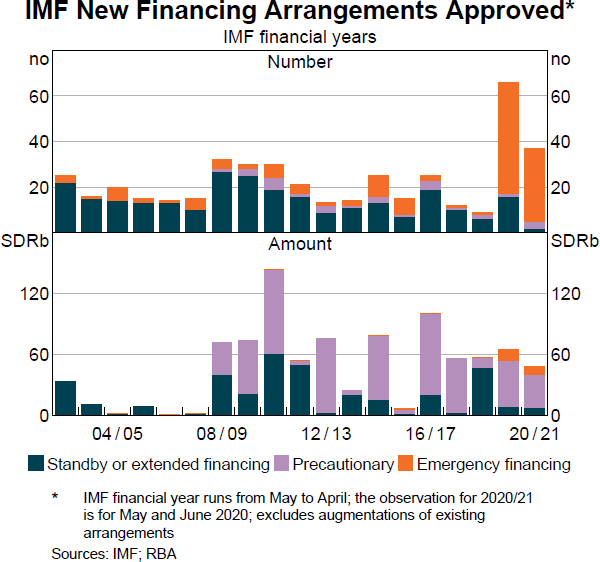
As with other IMF members, the Fund periodically undertakes Financial Sector Assessment Program (FSAP) reviews of Australia's financial system and regulatory framework. The Reserve Bank and other CFR agencies continued to implement recommendations made in early 2019 by the Fund following its FSAP review of Australia. The recommendations of direct relevance to the Bank relate to the regulation of FMIs, including recommendations to implement a resolution regime for FMIs and to strengthen supervisory and enforcement powers for clearing and settlement facilities. As joint regulators for clearing and settlement facilities, the Bank and the Australian Securities and Investments Commission worked together in a CFR working group on policy proposals in this area. The CFR issued a consultation paper in November 2019, and finalised policy proposals were provided to the Australian Government in July 2020.

Photo: International Monetary Fund
Executives' Meeting of East Asia-Pacific Central Banks (EMEAP)
Purpose
EMEAP brings together central banks from 11 economies in the east Asia-Pacific region – Australia, China, Hong Kong SAR, Indonesia, Japan, South Korea, Malaysia, New Zealand, the Philippines, Singapore and Thailand – to discuss issues relevant to monetary policy, financial markets, financial stability and payments systems in the region.
Reserve Bank Involvement
The Reserve Bank participates in EMEAP, including at the Governor and Deputy Governor levels. Staff also participate in the EMEAP Working Groups on Financial Markets, Banking Supervision, and Payments and Market Infrastructures, and in meetings of Information Technology (IT) Directors. These groups also maintain close relationships with international institutions such as the IMF and the BIS, through regular dialogue on topical issues.
EMEAP's Monetary and Financial Stability Committee (MFSC) meetings, which are chaired by the Reserve Bank's Deputy Governor, provide an important forum for the discussion of current economic and financial market issues of direct relevance to EMEAP members. The MFSC met three times in 2019/20, including twice via teleconference. At its meeting in late 2019, the MFSC discussed a range of issues including risks for central banks from environmental change and the implications of digital currencies. The meetings in the latter part of 2019/20 focused on economic and financial market developments arising from the COVID-19 pandemic and associated policy responses. These meetings included discussion of risks to the banking sector, the potential for further bouts of volatility in capital flows, and the longer term implications of current policy measures.
The Working Group on Financial Markets focuses on the analysis and development of foreign exchange, money and bond markets in the region. Every second meeting of this group is held in conjunction with the BIS Financial Markets Forum. During the year, the group continued its work on developing local currency bond markets, through the Asian Bond Fund Initiative (see the chapter on ‘Operations in Financial Markets’ for details of the Reserve Bank's investments in the Asian Bond Fund). Areas of focus in 2019/20 also included financial benchmark reform and the development of securities lending in Asia and US dollar funding dynamics in Asia.
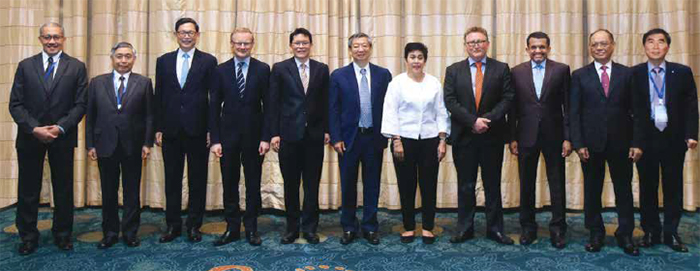
Photo: People's Bank of China
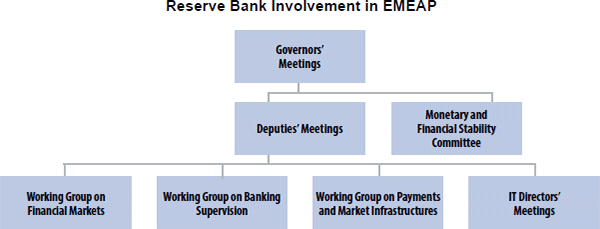
The Working Group on Banking Supervision (which also includes representatives of EMEAP members' prudential regulators, including APRA) meets to share experiences about best practices in banking supervision; to discuss regional financial sector issues; and to conduct joint work and analysis on relevant topics. At its meetings over 2019/20, members discussed the use of liquidity buffers during the current challenging environment; their frameworks for emergency liquidity assistance; financial institutions' cyber-security risk management; and climate-related risks faced by banks. The group also has ongoing areas of focus, including the health of banking systems in the region; emerging financial stability risks; and monitoring the implementation of Basel III reforms among members.
The EMEAP Working Group on Payments and Market Infrastructures is a forum for sharing information and experiences relating to the development, oversight and regulation of retail payment systems and FMIs. During 2019/20, members discussed a range of issues, including the development of fast retail payment systems and other efforts to facilitate the shift towards electronic payments; regulatory approaches for addressing risks posed by crypto-assets and global stablecoin arrangements; research into central bank digital currencies; measures to enhance the security and resilience of FMIs; and oversight approaches to FMIs. The group also embarked on a review of developments in cross-border retail payments in the EMEAP region, including to identify any gaps or challenges in the provision of such services.
The IT Directors' Meeting provides a forum for discussions on developments in IT and its implications for central banks. Topics including cybersecurity and digital transformation were discussed during 2019/20.
Network for Greening the Financial System (NGFS)
Purpose
The NGFS is a group of central banks and supervisors whose purpose is to share best practices, contribute to the development of climate and environment-related risk management in the financial sector, and mobilise mainstream finance to support the transition towards a sustainable economy. As at the end of June 2020, the Network had grown to comprise 66 members and 13 observers, across six continents.
Reserve Bank Involvement
The Reserve Bank joined the NGFS in July 2018. The Deputy Governor represents the Bank on the NGFS Plenary, supported by other senior staff. Over 2019/20, the Bank actively participated in two of the NGFS workstreams: the Macrofinancial workstream, which aims to develop an analytical framework for assessing climate-related risks to the economy and financial system, and the monetary policy subgroup of the Scaling up Green Finance workstream, which aims to understand how climate change affects monetary policy frameworks and objectives.
The NGFS produced a series of reports in 2019/20, including a technical supplement to the first comprehensive report outlining the macroeconomic and financial stability risks associated with climate change; a sustainable and responsible investment guide for portfolio management; a guide for supervisors on integrating climate-related and environmental risks into prudential supervision; and the results of a point-in-time survey of how financial institutions are tracking ‘green’, ‘non-green’ and ‘brown’ risk profiles. At the end of June 2020, the NGFS released a set of reference scenarios to support the work of central banks and supervisors in assessing the magnitude and direction of climate-related risks in their own jurisdictions, a short paper outlining the impacts of climate-related risks on the formulation of monetary policy and a list of research priorities.
Global Foreign Exchange Committee (GFXC)
Purpose
The GFXC is a forum that brings together central banks and private sector participants in the wholesale foreign exchange market. The committee aims to promote a robust and liquid market. One means by which it does this is through the maintenance of the FX Global Code as a set of principles of good practice for market participants.
Reserve Bank Involvement
The Deputy Governor has served as Chair of the GFXC since June 2019. The Reserve Bank sponsors the Australian Foreign Exchange Committee (AFXC), one of the 17 regional committees that comprise the membership of the GFXC. The Assistant Governor (Financial Markets) is Chair of the AFXC and the Bank's representative on the GFXC.
During the past year, the GFXC commenced its review of the FX Global Code, a commitment it had made when launching the Code in 2017. Following liaison with market participants, the GFXC established its areas of focus for updating the Code. This included strengthening the role of disclosures and considering whether further guidance is needed on certain trading practices, such as anonymous trading, algorithmic trading and the use of ‘pre-hedging’ and ‘last look’. Fostering greater adherence to the Code among buy-side market participants also remains a priority for the GFXC.
The period following the onset of the COVID-19 pandemic saw greater volatility within foreign exchange markets and created operational challenges for many market participants as working arrangements needed to be altered. Through market notices, the GFXC stressed the relevance of the Code's principles as a means of ensuring that market participants' actions would contribute to the FX market remaining robust and appropriately transparent. The review of the Code was paused for a few months in response to the pandemic and is currently scheduled for completion in mid 2021.
Organisation for Economic Co-operation and Development (OECD)
Purpose
The OECD comprises the governments of 37 countries and provides a forum in which governments can work together to share experiences and seek solutions to common problems, including economic and financial ones.
Reserve Bank Involvement
The Reserve Bank's Chief Representative in Europe participates in the OECD's Committee on Financial Markets and the Advisory Task Force on the OECD Codes of Liberalisation.
The OECD Committee on Financial Markets examines a range of financial market issues and aims to promote efficient, open, stable and sound financial systems. The committee's regular discussions with private sector experts in 2019/20 covered factors that are driving weak productivity growth in advanced countries and the economic consequences of COVID-19 for public and private markets. The committee also continued to review and contribute to the OECD's work on environmental, social and governance investing, blockchain, open banking and digitalisation.
The OECD's Codes of Liberalisation are rules-based frameworks to promote the freedom of cross-border capital movements and financial services. All OECD members adhere to the Codes. The Advisory Task Force on the OECD Codes of Liberalisation meets periodically to address questions and discuss policy issues related to the Codes. It also examines specific measures by individual adherents with relevance to their obligations under the Codes.
Technical Cooperation and Bilateral Relations
Australia Indonesia Partnership for Economic Development (Prospera)
The Bank participates in the Australian Government's ‘Prospera’ program, which is aimed at institutional capacity-building in Indonesia. Under the Prospera Program, the Reserve Bank engages with Bank Indonesia on a broad range of activities undertaken by central banks. In 2019/20, a total of 20 Bank Indonesia staff visited the Reserve Bank to discuss issues relating to the payments system and the management of cash in the financial system.
Engagement in the South Pacific
The Reserve Bank fosters close ties with South Pacific countries through participation in high-level meetings, staff exchanges and the provision of technical assistance across a wide range of central banking issues.
In November 2019, the Reserve Bank hosted the annual meeting of the South Pacific Central Bank Governors in Sydney. Discussions were also held with commercial banks operating in the region. The Governors discussed recent economic and financial developments and resolved to jointly develop a framework that would underpin a regional ‘Know-Your-Customer’ facility. Work on the first stage of this project has been progressing steadily, with the central bank working group on track to make recommendations to Governors in late 2020.
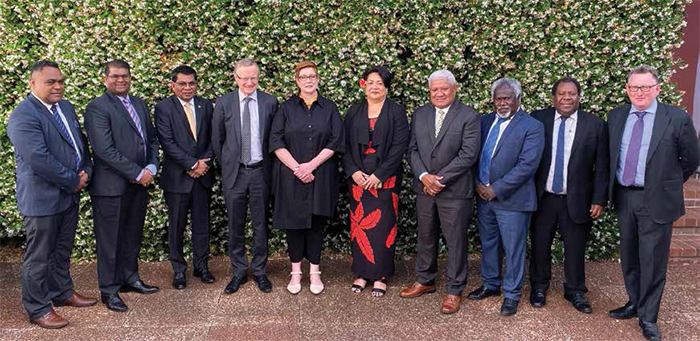
The Bank also hosted a joint meeting of the South Pacific Governors and the Network for Greening the Financial System, which included representatives from insurers, international organisations and academic institutions. In June 2020, the South Pacific Governors spoke via teleconference to discuss recent economic developments and policy responses to the COVID-19 pandemic.
The Reserve Bank also provides financial support for an officer of the Bank of Papua New Guinea to undertake postgraduate studies in economics, finance or computing at an Australian university. This support is provided via the Reserve Bank of Australia Graduate Scholarship, which was first awarded in 1992. The most recent recipient of this scholarship commenced studies at the University of Queensland in July 2018.
International visitors and secondments
As in previous years, the Reserve Bank hosted a number of overseas visitors, predominantly from foreign central banks. The number of visits has been affected by the COVID-19 pandemic: no overseas visitors have been received by the Bank since mid-March 2020 and all visits that had been planned were cancelled. Visits completed prior to mid-March 2020 covered a range of the Bank's activities and included delegations from Indonesia, Papua New Guinea, Saudi Arabia and Tanzania. The Bank also hosted secondees from the Deutsche Bundesbank and the Reserve Bank of New Zealand. A number of Reserve Bank staff were seconded to other central banks and various international organisations, including the BIS, the Bank of Canada, the Bank of England, the IMF and the Reserve Bank of New Zealand. These arrangements facilitate a valuable exchange of skills and expertise between the Bank and the broader global economic and financial policymaking community.
Footnotes
The Framework Working Group helps to implement the G20's ‘Framework for Strong, Sustainable and Balanced Growth’. [1]
Further detail on the activities of the FSB is reported in the ‘Regulatory Developments’ chapter of the Reserve Bank's semi-annual Financial Stability Review. [2]